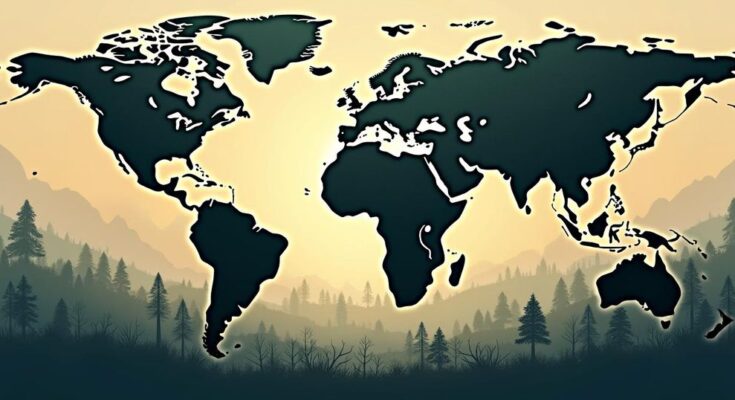A recent study indicates that deforestation is increasing globally, with 6.37 million hectares lost in 2023—far surpassing commitments to end this trend by 2030. Key regions of concern include Bolivia and Indonesia, where deforestation rates have surged. Although Brazil has made progress in certain areas, challenges remain. The urgent need for robust policy enforcement and a reevaluation of consumption practices is highlighted as essential to address this critical issue.
A recent study has revealed that global deforestation rates continue to escalate, surpassing the commitments made by over 140 world leaders to halt deforestation by 2030. In 2023 alone, approximately 6.37 million hectares of trees were lost, an area comparable to the size of Ireland, as reported by various research entities and NGOs. Forests, which house 80 percent of terrestrial biodiversity and are vital for maintaining water cycles and sequestering carbon dioxide, remain under severe threat. Ivan Palmegiani, a biodiversity and land-use expert from Climate Focus and the principal author of the “Forest Declaration Assessment” report, emphasized the alarming trend, stating, “Globally, deforestation has gotten worse, not better, since the beginning of the decade.” He noted the urgency with only six years remaining to meet global targets to end deforestation. The report highlights that in 2023, 3.7 million hectares of tropical primary forests—vital ecosystems rich in carbon and biodiversity—were eliminated, a number that should have been significantly reduced to achieve the 2030 goals. In regions categorized as high-risk, Bolivia has experienced a staggering increase in deforestation, rising by 351 percent from 2015 to 2023. The report attributes this to agricultural expansion, primarily for soybean production, along with beef and sugar cultivation. Indonesia exhibited a similar trend; although deforestation rates had declined from 2020 to 2022, there was a sharp rise last year, reportedly due to increased demand for sustainable materials such as viscose and a spike in nickel mining to support the electric vehicle and renewable energy sectors. On a more favorable note, Brazil has made some advancements in forest conservation, particularly in the Amazon rainforest, aided by protective initiatives implemented by President Luiz Inacio Lula da Silva. However, deforestation rates in the Cerrado savannah have concurrently increased. The report further underscores the detrimental impacts of logging, road construction, and wildfires on forest degradation. In 2022, an area twice the size of Germany experienced degradation rather than complete deforestation. Erin Matson, a senior consultant at Climate Focus and co-author of the study, stressed the necessity for robust policy frameworks and stringent enforcement, asserting, “To meet global forest protection targets, we must make forest protection immune to political and economic whims.” This report has emerged against the backdrop of the European Commission’s recent proposal to delay the implementation of its anti-deforestation legislation until the end of 2025, despite backlash from NGOs. Matson elaborated on the need for a paradigm shift in resource consumption and production to prevent the exhaustive exploitation of natural resources.
Deforestation poses a significant threat to global biodiversity and environmental stability, contributing to climate change as trees serve as essential carbon sinks. Recent commitments from global leaders aimed to address this issue, pledging to halt deforestation by 2030. The continued loss of forests challenges these promises, highlighting the urgent need for effective policy responses and global cooperation to mitigate environmental degradation. Countries like Bolivia and Indonesia are under increased scrutiny due to rising deforestation rates, while Brazil exhibits mixed progress, with improvements in some areas amid ongoing challenges in others.
In summary, the recent assessment of global deforestation shows an alarming trend that contradicts international commitments to halt such practices by 2030. With regions like Bolivia and Indonesia witnessing significant forest loss, and Brazil experiencing both advancements and setbacks, there is an urgent need for strong policies and collective action to safeguard the world’s forests. Enhanced international cooperation and innovation in sustainable resource management are vital to reversing the current trajectories and fulfilling global environmental commitments.
Original Source: phys.org




